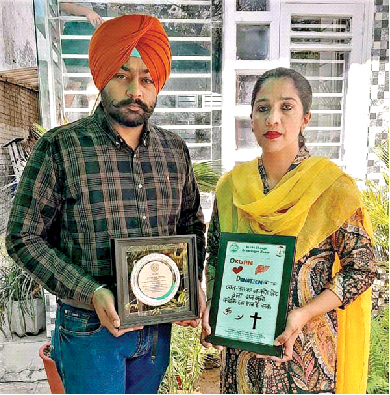India is the land of solitaires, ascetics and sacrifices. Even when there was no sunrise of civilisation in other parts of the world, even here, many great men like Maharishi Dadhichi, Raja Shivi and Rantidev were committing self-sacrifice by donating their bodies or giving their lives for the welfare of the world. Therefore, it can be said that organ donation or body donation is not a new subject for Indians. All that is needed is to create motivation and awareness.

Conveying the Message
In the broadcast of Mann Ki Baat on March 26, 2023, Prime Minister Shri Narendra Modi kept this topic poignantly and effectively. Especially when the person sitting on the most important seat in the country makes this social need a topic of discussion, then naturally everyone’s vision goes on the importance and seriousness of this topic. It also becomes a matter of immense satisfaction and enthusiasm for individuals and organisations working in the field of disability. There are two important approaches for those working specifically in the field of disability. The first method is empowerment and self-reliance of the disabled (divyang or specially abled), and the second is to try the prevention of disability. Organ donation is related to this second method. On the one hand, visual impairment caused by cornea can be prevented through eye donation. On the other hand, someone’s life can be saved by the determination to donate kidney, liver etc. Blood donation can also save the lives of people suffering from thalassemia, haemophilia and sickle cell. It is worth mentioning that the organisation working in the field of disability, SAKSHAM (Samdrushti Kshamta Vikas Evam Anusandhan Mandal) is unique as it is working in the field of all 21 types of disabilities prescribed by the RPD Act 2016. Its slogan is Jitey Jitey Raktdaan, Jatey Jatey Netradaan (Donate blood while alive, donate eyes while leaving).
Noble Deeds
Without blowing its trumpet, SAKSHAM has been quietly working round-the-clock for ‘divyang’
Saksham
- It has units in 336 districts of 44 Prants.
- Divyang Centres: 154
- Beneficiaries: 33,593
- Eye Donations: 975
- Cataracts Operations: 16,705
- Squint Operations: 89
- Incubation centre and Planning and innovation centre for divyangs: 700
Beneficiaries
Dadhichi Deh Dan Samiti
- Total Donations: 1299 (As of March 20, 2023)
- Body Donors: 374
- Eye and Organ Donor: 925
Correcting Vision
One-fourth of the blind population of the world resides in India. There is a large proportion of the number of blind people who can see again if the cornea is received through eye donation. How many people need cornea? How many people have registered? The figures regarding this are also not clear. Hence, SAKSHAM started CAMBA (Corneal Andhatva Mukt Bharat Abhiyan ) on March 5, 2016 in which many activities are included from eye-awareness to survey. The process of eye donation is also very simple. A person desirous of eye donation in his life has to fill an eye donation pledge letter. Eye donation takes place only after death. The family can contact the hospital through any voluntary organisation like SAKSHAM etc. or on its own. Eye donation is possible for a period of about 6 hours after death. The medical team removes only a very thin membrane from the eye, which is called cornea. It takes at most 10-15 minutes to extract it. Removal of the cornea does not cause any disfigurement in the dead body.
Meeting Demand Globally
Sri Lanka is a small country. Eye donation has become a tradition there and from there the cornea goes to other countries as well. If the tradition of eye donation develops in our country too, then not only will we be able to meet the demand of cornea quickly, but it is also possible to fulfil the need of cornea in many countries of the world. From this point of view, there is a need to eradicate misconceptions and create awareness among the citizens.
The parents of the country’s youngest organ donor, 39-day-old Ababat Kaur, were in for a surprise when Prime Minister Narendra Modi introduced them to the nation in his Mann Ki Baat. The kidneys donated by the baby saved the life of a 15-year-old boy from Patiala in December 2020. Just as Sukhbir Singh Sandhu and his wife Supreet Kaur decided on organ donation of their 39-day-old daughter Ababat Kaur when she was brain dead, similar is the case of Snehlata Chowdhary of Jharkhand. When she was about to die, her family members decided on her organ donation. If other family members of the deceased show the same courage, then many others can get a healthy life. The Prime Minister has assured that organ donation rule will be further simplified. Certainly, such sensitive steps by the Government will create a positive environment in the country and the citizens of India will be ready to fulfil their obligations towards their brothers and sisters with more sensitivity and goodwill. This way, we will again carry forward a healthy and grand tradition.

















Comments